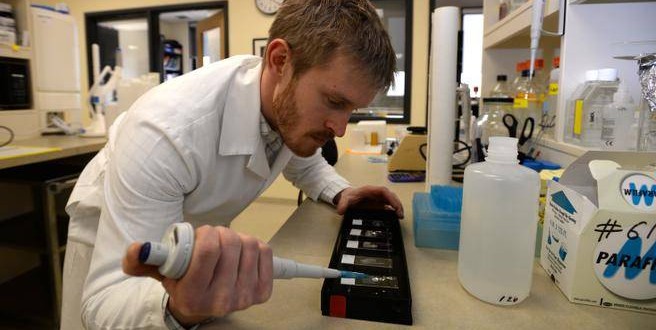Alec Falkenham doesn’t regret any of his own tattoos. But the Dalhousie University researcher wants to help those who do want to remove what’s etched in their skin.
A 27-year-old PhD student in the university’s pathology department, is developing a topical creme that he says will make tattoo ink eventually fade away.
“When comparing it to laser-based tattoo removal, in which you see the burns, the scarring, and the blisters, in this case, we’ve designed a drug that doesn’t really have much off-target effect,” he said.
“We’re not targeting any of the normal skin cells, so you won’t see a lot of inflammation. In fact, based on the process that we’re actually using, we don’t think there will be any inflammation at all and it would actually be anti-inflammatory.”
Tattooing is as old as the humanity itself. There are various reasons for having a tattoo, from tribal markings and snake bite poison protection, to criminal or artistic domain, from simple words or lines to a multicolor work of art covering the whole body.
The process it self is very painful as the needle dipped in ink rips through skin leaving the pigment beneath the first skin layer. The macrophages carry some of the ink to the body’s lymph nodes. However, some of those macrophages that are filled with ink stay put, embedded in the skin. That’s what makes the tattoo visible under the skin.
Reportedly, Falkenham’s topical creme works by targeting the macrophages that have remained at the site of the tattoo. New macrophages move in to consume the previously pigment-filled macrophages and then migrate to the lymph nodes, eventually taking all the dye with them, and because it is a cream, there’s no injection and no inflammation. Eventually, according to Falkenham, the tattoo should fade away.
Falkenham is working with the university’s Industry Liaison and Innovation office to patent his technology. He and the ILI office has secured funding through Springboard Atlantic and Innovacorp Early Stage Commercialization Fund for his research.
The creme has been tested on pigskin so far, which is as closes to a human skin as it can be. If human testing goes well, the product may soon be on the market for as little as $4.50 per treatment, Falkenham said.
Agencies/Canadajournal
 Canada Journal – News of the World Articles and videos to bring you the biggest Canadian news stories from across the country every day
Canada Journal – News of the World Articles and videos to bring you the biggest Canadian news stories from across the country every day




Maybe he can tackle cancer or a cold next, good work Alec, I hope this makes you wealthy. I have always wondered about how all these kids are gonna feel in 15 years with a skull on their neck. I’m glad some people there don’t spend all their time on Facebook wreaking havoc on humankind.
where i can bought this cream tattoo?? please answer me. thankyou